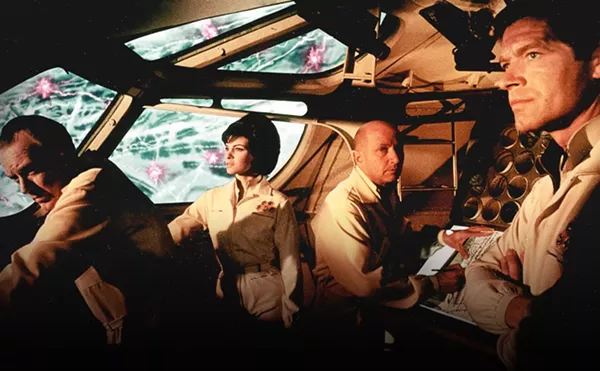The kids, dressed in their Sunday best, hold their parents' hands as they walk toward the Magness Arena on the University of Denver campus. We follow behind, my girlfriend gripping my own hand tightly. At the foot of the steps there's a football pre-game party just getting started; kids holding red cups are sitting on thrift-store couches, listening to "Born in the USA." Someone asks if we want a beer but I decline; we are not here to drink. We are here to get our Jesus on.
Tonight, April 6, is the Denver premiere of The Thorn 2012, a big-budget epic of Bible theater sometimes described as "Cirque Du Soleil meets The Passion of the Christ." It was the novelty of such a mash-up that attracted my girlfriend to come along, but now that we're here she looks as though she wants to bolt for the car. As we walk inside, two large men costumed as Roman soldiers stop us, grab my girlfriend's wrist and actually ask me, "Do you have proof of ownership of this woman?"
After some nervous laughs and playing-along banter, the guards let us pass and we find our seats. "What the hell was that?" my girlfriend asks.
Despite growing up in Colorado Springs, my girlfriend has had almost no experience with the evangelical community and has always seen belief in God and the afterlife as "kind of silly." She wasn't raised with religion and has almost no context for these Bible stories -- whereas I have an over-familiarity with them, having grown up in an intense, outback Midwestern Pentecostalism, not only attending church activities nine times a week but participating in similar passion plays twice a year since almost the time I learned to walk.
As a sensory experience, The Thorn is an impressive exhibition of choreographed dances, pyrotechnics, acrobatics and multi-media stage production. Sitting in the front row, we have to shield our eyes when the jet-engine style flames roar twenty feet into the air. The bass from the music rumbles our bellies, and I uncontrollably exclaim "Jesus Christ!" when an unexpected explosion catches me off-guard.
Obviously, I have long since shed the skin of the creationist worldview, and now take great pleasure in taking "our Lord's name in vain," a sin I once believed would damn me to an eternity of torture in Hell. Like a majority of young evangelicals, when I reached college age I discovered books, psychotropics, sex and academic debate, and suddenly agreed with my girlfriend that the Bible and belief in God all seemed "kind of silly."
For the most part, the adults in this auditorium either represent those who didn't lose the faith as young evangelicals, or experienced some tragedy later in life that drove them to Jesus. Those behind The Thorn understand this dynamic. After the thespian Christ is crucified (it's worth noting that this crucifixion is significantly less snuff-like than Mel Gibson's gore-porn film version), Thorn creator John Bolin interrupts the narrative, walking on stage with a microphone to directly ask the audience to "consider the sacrifice of Jesus." Syrupy piano music plays over his speech, while he talks about how our sins have "earned us death" but "Jesus paid the price."
Some of us in the audience "have come here tonight with heavy hearts," he continues. "Maybe you've got a relationship that's breaking apart, or you've received a doctor's diagnosis and you don't know what to do; maybe there's a secret addiction in your life, but I want you to know that there's healing at the foot of the cross."
He invites those to which this applies to leave their seats and come down to speak with the friendly counselors who are waiting at the sides of the stage. To my girlfriend's shock, a large portion of the audience does so, many with tears in their eyes, outnumbering the counselors ten to one. For someone who has never believed in God, this all seems baffling -- but for a believer (or former believer, in my case) it's all quite beautiful.
Before I read the books of Christopher Hitchens and Richard Dawkins and began toying with the idea that my thoughts were my own and no God was monitoring them, I regularly felt the narcotic high of belief. Praying several times a day, contemplating heaven, seeing the world through a juvenile lens of good and evil, it's a consistent, on-demand blast of serotonin to get you through any trial. And events like The Thorn are the king-top orgy of neurological good-times -- granted, a celibate, sober orgy, but basically the same end result. A University of Pennsylvania study of subjects in heightened states of Pentecostal worship showed that the frontal lobe of the brain (which controls, among other things, rationality and self-control) slowly shuts down, whereas the temporal lobe -- the emotional, sentimental side of the brain -- flares up with activity.
When John Bolin mentions things like illness, or relationship troubles or addiction, he's covering a large territory of very common life problems. And by offering an immediate, emotional solution to those problems, one requiring nothing more than walking down some steps, meeting with a friendly counselor and filling out a card with all your contact information, you have a product that sells itself. It's something the temporal lobe responds to.
On the surface, it does sound "silly." But it's different when you've sat through an hour of visceral assaults on your senses, with unexpected bombs exploding, demons screaming and a very nice man with a beard being grotesquely tortured before your very eyes. Things like this make you feel vulnerable, open you up to new ideas. It's a tactic that is much more effectively executed each Halloween through Hell Houses, those church-funded gauntlets of sensory torture that temporarily rob you of your sanity and could turn even Bill Maher into a member of the 700 Club.None of this really outrages me while I watch The Thorn. The only outrage I feel is over the glaring historical inaccuracies. And it's not like I'm nitpicking about the Pharisees wearing the wrong robes or Jesus's obvious use of a straightening iron (whereas the real Jesus -- if he existed -- would have had a kinky Jew-fro). It's things like the assertion that Jesus performed "thousands" of miracles. Or that the narrator of the play (for the most part, he's the only one who speaks -- everything else is a collection of montages) is a mash-up of three different biblical characters. His name is John, but he refers to being both Jesus disciple (John of Zebedee) as well as John, the author of the book of Revelations (John of Patmos) and the author of the Gospel according to John.
"That is SO inaccurate!" I shout/whisper into my girlfriend's ear during the performance. It's not like this stuff is even debatable among Christians: Scholarly believers acknowledge that the disciple John didn't write the Gospel (it was penned about fifty to sixty years after Jesus's death), and certainly accept that he wasn't the same fellow who wrote The Book of Revelation; that guy is believed to have lived about two generations after Jesus's time.
I wouldn't get uptight about this stuff if The Thorn (and countless other passion plays produced around the world for hundreds of years) didn't present this story as historical fact. As in: this is what happened, this man died for your sin, and he certainly rose from the dead. Secular historians assert that Jesus the man most likely never existed; outside of a handful of references by the Jewish historian Josephus, there is little evidence of him. And since the story is a kind of greatest hits of all the gods and heroes of the Mediterranean -- centuries before Jesus -- many propose that the big JC was as real as Hercules.
But most of the people we are surrounded by at The Thorn don't see things this way. They view this story of Eve and her apple, Moses and his Exodus, and Jesus and his miracles as the way it all happened. They weep at Jesus's death and cheer during his resurrection -- and likely are praying throughout, illuminating their temporal lobes as they thank Jesus for all he has done for them.
As we walk back to the car -- surrounded by others wiping tears from their eyes and getting into SUVs with bumperstickers reading "God is my co-pilot" -- my girlfriend still can't get over how so many parents subjected their kids to such a production. "It's really a form a child abuse," she says. Her statement briefly reminds me of a similar sentiment uttered by outspoken atheist Richard Dawkins when asked to comment on Catholic priests molesting children: "It may do them less lasting damage than the mental abuse of bringing them up Catholic in the first place."
But for the most part, I'm stuck observing the faces of those leaving The Thorn. I have countless memories of being in the same place they are, loving the narcotic high of belief, allowing myself to shut down rationality and feel the love of a God I was sure existed. Unlike my girlfriend, I do not think they are all "kind of silly." I am actually quite jealous. The catharsis in the believers' faces is obvious; they are experts at subduing their frontal lobes, controlling their self-control until there is nothing left but a blissful de-evolution: knowing that Jesus is in heaven, winking down on their SUV as they drive home to suburbs. But instead of begging them to take me with them, my girlfriend and I drive home to Capitol Hill, our frontal lobes active and our atheism intact.
The Thorn repeats at 4 and and 7 p.m. today. For tickets or more information, visit www.thethorn.net.












